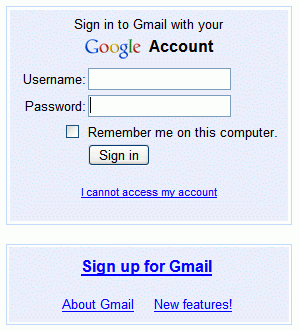
Google's Gmail service suffers from security flaws that make it trivial for attackers to create authentic-looking spoof pages that steal users' login credentials, a security expert has demonstrated. Google Calendar and other sensitive Google services are susceptible to similar tampering.
A proof-of-concept (PoC) attack, published by Adrian Pastor of the GNUCitizen ethical hacking collective, exploits a weakness in the google.com domain that allows him to inject third-party content into Google pages. The result is this page: (
http://mail.google.com/imgres?imgurl=http://SecureGoogleMail&imgrefurl=%68%74%74%70%3a%2f%2f%73%6e%69%70%75%72%6c%2e%63%6f%6d/482f3 ), which allowed him (at time of writing, anyway) to display a fraudulent Gmail login page that displayed mail.google.com in the browser's address bar.
"The previous PoC URL will cause the entered credentials to be submitted to
www.gnucitizen.org when clicking on the Sign in, so please do NOT submit any real credentials," Pastor warns here:
http://www.gnucitizen.org/blog/frame-injection-fun/A Google spokesman said company security pros were looking into the reports.
The attack is another cautionary reminder to designers of websites and software of the importance of fixing vulnerabilities even when they may at first appear inconsequential.
In this case, the seemingly inconsequential weakness was discovered by security researcher Aviv Raff and reported to Google's security department in April. Raff had noticed a domain-wide design flaw in google.com that allowed maps, calendars, and other applications to be accessed over multiple google.com subdomains. The URL here: (
http://maps.google.com/news?sa=N&tab=ln ), which allows Google News to be accessed via the Google Maps subdomain, shows this flaw in action. Other vulnerable Google services include Mail, Images, History, Search, and Apps.
So what's the big deal? "One small XSS [cross-site scripting] issue in Google Maps can now be exploited to hijack Google, GMail, or Google Apps accounts, by bypassing the browser's Same Origin Policy," Raff explained here. (
http://aviv.raffon.net/2008/10/10/SharingIsNotAlwaysAGoodThing.aspx ). In other words, combined with another seemingly inconsequential flaw, it can be enough to steal a Google user's login credentials.
That's exactly what Pastor did in fashioning his attack. He coupled the web-app sharing flaw with a frame injection vulnerability in Google Images. The result is a spoof page that looks sufficiently authentic to trick a large number of users into giving an attacker their Google account credentials. Closing the cross-domain weakness may not have made Pastor's attack impossible, but it would probably make it much less powerful or more obvious.
In the past, we've found Google's security team to be among the more proactive in stamping out bugs that could put their users at risk. So we're surprised to find that members sat on Raff's report for six months. The company is also among the more sensitive to reports in the press and the blogosphere about gaping security holes. We wouldn't be surprised if they're closed in short order.
(The Register)
 Total Members: 14197
Total Members: 14197 Latest: Levine
Latest: Levine Total Posts: 43431
Total Posts: 43431 Total Topics: 16526
Total Topics: 16526 Online today: 2972
Online today: 2972 Online ever: 51419
Online ever: 51419 Total Members: 14197
Total Members: 14197 Latest: Levine
Latest: Levine Total Posts: 43431
Total Posts: 43431 Total Topics: 16526
Total Topics: 16526 Online today: 2972
Online today: 2972 Online ever: 51419
Online ever: 51419